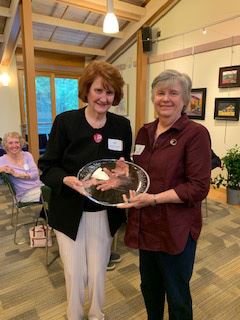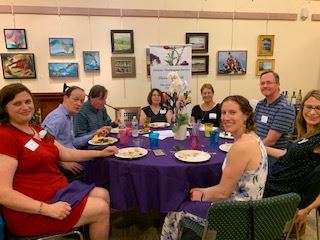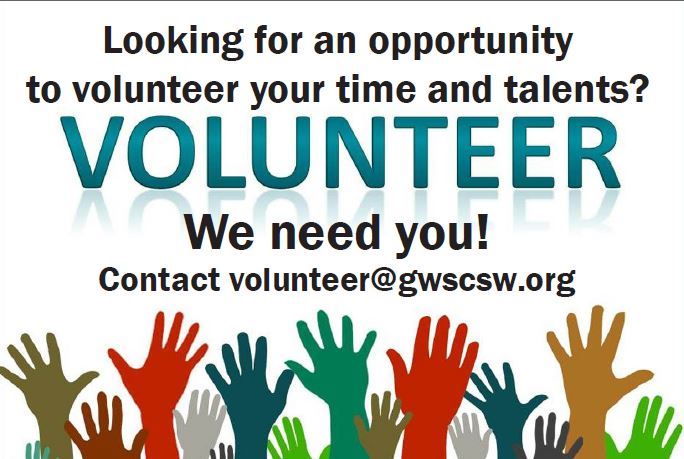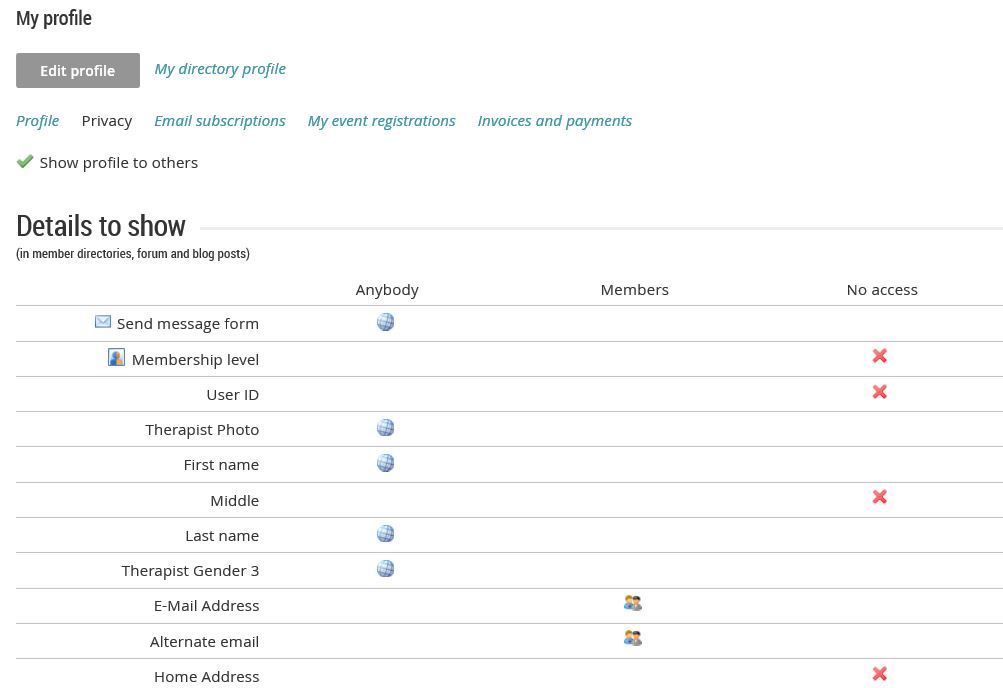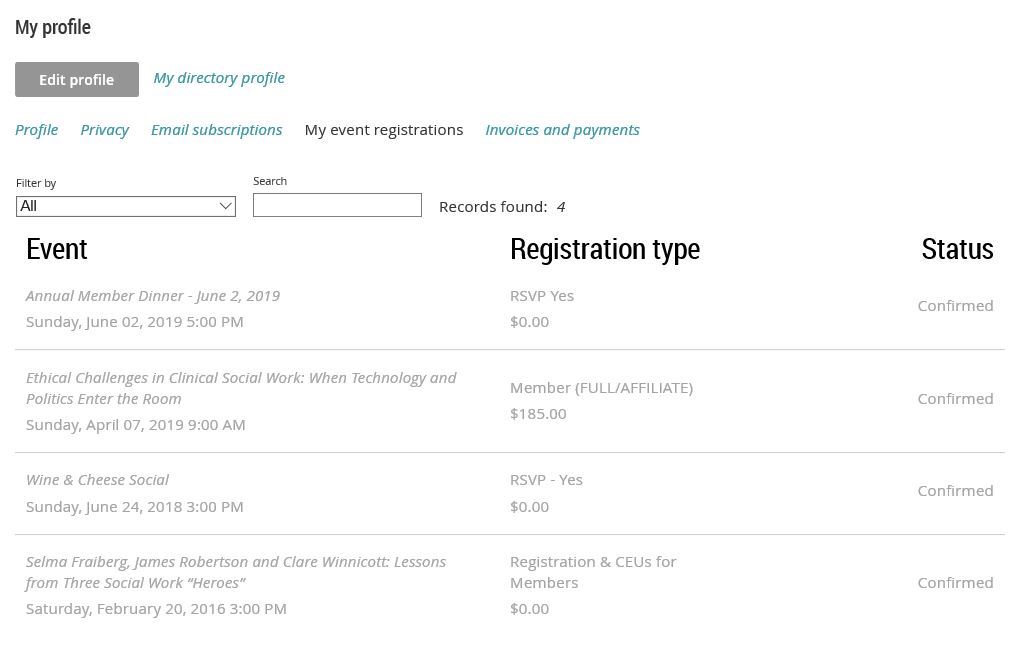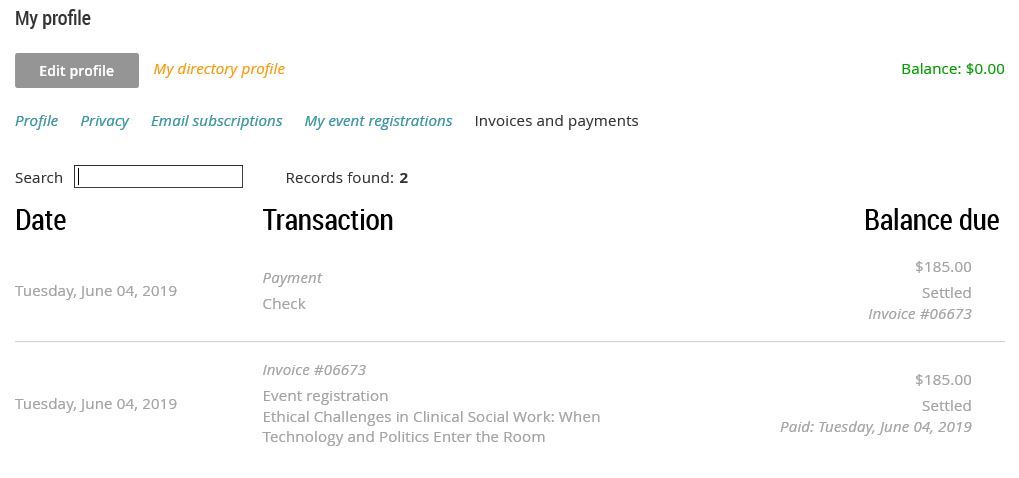In This Issue | JUNE 2019
President's Message
Mary Moore
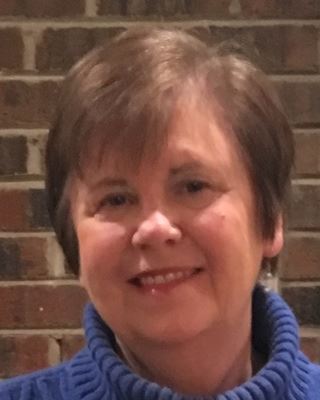
What a great Spring we have had, with many successful events!
In March, the Conference Committee, which is headed by Dolores Paulson, put on the Frederick Reamer Conference. The venue we usually use every 2 years, the 4-H Club, cancelled at the last minute. Dolores was able to secure co-sponsorship and a lovely venue at Catholic University. Dr. Reamer offered a great program, as usual, this year focusing on ethics related to the internet and politics. Attendance was at an all-time high, even with the last-minute venue change. Thank you, Dolores, Audrey Walker, Susan Post and Golnar Simpson!
In April, Cindy Crane, co-chair of our beloved membership committee, hosted the new member brunch at her home in Bethesda.
It was an animated gathering, with everyone mingling and getting to know each other, and I loved meeting so many interesting and enthusiastic new and not-so-new members! The gorgeous weather made it possible to enjoy the delicious food and drink in Cindy’s beautiful backyard with her very sociable Australian Shepherds, an added bonus. Those of you who couldn’t make it, try to come next time. - Susan Post
We have begun personally inviting all members who have joined in the past 2 years to these new member brunches, in the Fall and Spring; this time that amounted to almost 300 new members! Steve Weschler, Karin Lee, Shauna Alonge, Beth Pascoe, Angie Harris, Amy Johnson, and Katie Smeltz stepped up to help committee members Catherine Lowry, Nancy Harris and Cindy Crane make these contacts. Thank you!
In May, the NASW DC Metro Chapter co-sponsored an event with GWSCSW to promote networking between early career social workers and social workers in Federal careers and DC Government careers. Keynote speaker HyeSook Chung, MSW, Former Deputy Mayor, HHS and current President of Baltimore City Foundation gave an inspiring address, followed by a “lightning round” of 2-3 minutes each from 10 clinical social workers in these careers, followed by half an hour of networking. The event was free and very well attended.
It was a creative event that called upon the talents of all walks of social work life. Enthusiastic students, early career professionals, and seasoned social workers all came out to connect and learn from one another. The evening showcased a dynamic group of social workers employed in government agencies, who each shared their experiences in clinical, mezzo, and macro work. The speakers offered a collection of both professional and personal stories from their unique paths, which highlighted the myriad of ways that social work values can make an impact. – Chrissy Wallace
Also in May, the Volunteer Brunch was held at Seasons 52 in Rockville. Beth Pascoe, our Volunteer Coordinator, put on a fantastic event to thank our volunteers and provide a great opportunity for networking with fellow members.
In June, we held our Annual Member Dinner at River Road Unitarian in Bethesda. This meeting is always well attended and enjoyed. The Annual Member Dinner committee, headed by Beverly Magida and Nancy Harris, always does a fantastic job of organizing this important and enjoyable event.
On a more somber note, in April we lost Albert Kassabian at the great age of 97. He was the husband of Alice Kassabian, one of our founders and a past president. He spoke at the Kassabian conference, which honors Alice, in November, as he has for many years. Albert was a highly esteemed attorney in Virginia and provided enormous support for Alice during their years of raising five accomplished children and Alice achieving her Ph.D. He will be sorely missed at future conferences, but his strong and devoted presence will be ever with us.
I hope you have a great summer!
MARYLAND SOCIAL WORKERS: AVOID 3 YEARS IN PRISON!!
Judy Gallant, LCSW-C
As has been reported in previous newsletters, there have been consistent efforts in recent sessions of the Maryland General Assembly to criminalize the failure of clinicians and other mandated reporters to report child abuse and neglect. Each year, we have submitted strong testimony to legislators against enacting such a bill. Although we were joined by the physicians in our objection to the bill, our efforts this year were unsuccessful.
Beginning October 1, 2019, IT WILL BECOME A MISDEMEANOR FOR A MANDATORY REPORTER TO KNOWINGLY FAIL TO PROVIDE A REQUIRED NOTICE OR MAKE A REQUIRED WRITTEN REPORT OF SUSPECTED CHILD ABUSE OR NEGLECT IF THE PERSON HAS ACTUAL KNOWLEDGE OF THE ABUSE OR NEGLECT. As of that date, a violator is guilty of a misdemeanor and subject to a maximum penalty of up to three years of imprisonment and/or a fine not to exceed $10,000. The bill only applies to a failure to report child abuse or neglect that occurs during the time the child is a minor.
We argued in our testimony this year that “penalties for a failure to report are already severe for all social workers and other mandated health care professionals, under the oversight of their licensing boards. Loss of one’s license, rendering the person unable to practice and earn a living, is the greatest penalty that could be put upon a health care professional….” In addition, we told legislators: “No effort to increase motivation to report abuse will result in increased protection if the protective resources are inadequate. The best chance of having an impact on the welfare of children is if there is an increase DSS Child Protective Services resources. If there are more caseworkers with smaller caseloads, more supportive supervision and training resources as well as compensation adjusted to be in keeping with the level of responsibility this work requires, we could hope to see a decrease in staff turnover, resulting a higher average level of experience in the workforce, and increased effectiveness of protective interventions.”
There are a few factors that may have led to the bill’s passage this year. Until this year, Delegate Kathleen Dumais has been the vice-chair of the House Judiciary Committee which these bills go through, and she had been successful at keeping the bills from moving forward. Because 60 new legislators changed the make-up of the General Assembly, Dumais was moved off of this committee, and a new vice-chair was installed. Additionally, one argument that is repeatedly made is that Maryland has been the only state in the country that does not have criminal penalties for mandated reporters for non-reporting of child abuse. The language of the bill was narrower this year than in some previous years, given that, in order to be criminally liable, the mandated reporter must “knowingly” fail to make the report if the person has “actual knowledge” of the abuse or neglect. Legislators have seen this bill, in one form or another for approximately the past 10 years and perhaps were worn down. It is small comfort to think that it potentially could have returned next session in a more dangerous form.
We should remember that the new law does not actually change our responsibilities in any way. We are required to report suspected child abuse and neglect currently, and that requirement will remain in October and beyond. The potential penalty is the only thing that is changing. The additional criminal penalty comes on top of the risk of losing our license to practice social work that has always been there if we did not make a report as required by law.
Insurance Redux
Gilbert Bliss, Towson, MD
A few years ago, I wrote an article for the Newsletter entitled "Enough Already," or "Why I Don't Accept Insurance." My life has taken an interesting turn since that time.
The article was written when I was in the full flower of my practice, with the phone ringing often enough that it seemed that there was some kind of stream that was feeding it. Along with fee-for-service clients, I was buoyed by referrals from an Employee Assistance Program, which helped me keep my hours full.
The first hint that something was happening was when the EAP referrals dried up. Calls and emails did not elicit any explanation for why this was happening. I assumed that I would have heard if there had been a complaint, but there was only that eerie quiet that comes with non-response.
I began to lose clients organically, either through their improvement or by moving away. Over time, the spaces in my schedule became longer. Also, some clients went on a bi-weekly schedule, with my agreement, so they became half-time work. I will admit to some sense of panic, initially.
I had raised my rates every summer and I did not pay particular attention to my website or the search engines to which I subscribed. As a result, there is a readiness on my part to blame myself, to look at this as my hubris playing out. There is truth to that, I am sure, but it also coincided with an unexpected spike in my blood pressure.
What has followed is a reexamination of my priorities and a willingness to step away from anything that insists on a commitment with which I do not want to engage. As a result, I have made quite a few people unhappy, but I have discovered that I have room to decide on what I want to do next. This article is part of that effort, as well as making contributions to the editorial page of the Baltimore Sun.
I have reapplied for credentialing with Blue Cross/Blue Shield, which seems happy to have me back. I applied to opt back in with Medicare, but I have to wait until my opt-out period is over in 2020. I was surprised at my comfort with taking insurance again. Perhaps it is because, in part, it is more in keeping with social work ethics.
The concept of thriving has transformed to having what I need and perhaps a little more, although having a little more than that would be fine. I am finding my voice with my articles, so I do not want to be so busy that I forego that time.
Now I walk a mile and a half and meditate for 20 minutes every day. I am focused on developing my local community. Sorry, folks, but I only drive to DC when I absolutely have to. I am at peace with where I have landed, and the phone does ring often enough that I am sure that my bills will be met. I believe that all of this has made me a better therapist, welcoming the engagement rather than being desperate for it. There may be another evolution yet, but at 71 years-old, it will have to be incredibly compelling.
 POSTING TO THE GWSCSW LISTSERV - To post to this group, send email to: listserv-gwscsw@googlegroups.com
POSTING TO THE GWSCSW LISTSERV - To post to this group, send email to: listserv-gwscsw@googlegroups.com
If you are not on the listserv, contact admin@gwscsw.org
L&A Branch report/Presentation at annual dinner on 6/2/19
By Judy Gallant
In speaking with members at various Society events about the work of the Legislation and Advocacy Branch, people frequently say, “I could never do what you do,” or “It’s just not my thing.”
Why do we feel that we cannot advocate for ourselves, or why don’t we feel the need to make it our thing to push for laws that could potentially improve the lives of our clients? This is especially puzzling when one of the important aspects of our work with patients is to help them work through the issues that hold them back from advocating for themselves.
I do understand our members having limited time and also that speaking to legislators or officials in a position of power can feel intimidating. I feel that way as well. I remind myself that our representatives do want and need to know the issues their constituents face, whether it has to do with protecting our profession or protecting services or mental health benefits that our clients need. For example, who better than clinical social workers could present a strong case for a jurisdiction to improve children’s mental health by creating trauma-informed school programs? We are the ones who can discuss our clinical knowledge about trauma treatment and child development to build support for legislation that could benefit many.
Here’s what we need: in Maryland, our lobbyist, Pam Metz Kasemeyer, lets us know what bills pertain to us and informs us about how the potential law might impact us and our clients. We need several people who can follow bills during the legislative session (January to April), discuss the pros and cons of what has been proposed and help decide whether to support, oppose, or suggest amendments that could improve the bills. We also monitor and provide input to the MD BSWE, and at times, to agencies that write regulations that impact us.
In Virginia, our lobbyist, Sue Rowland, informs us about how potential laws might impact us and our clients. Our Society then collaborates with the Virginia Society for Clinical Social Work to determine steps that need to be taken and how to involve its members. We need one or two additional people to help keep members informed of social issues and actions impacting them and their clients.
In DC, we need people to help monitor issues the DC Council is considering, as well as follow issues the Board of Social work is dealing with. You can get invited to participate in CFSA stakeholder meetings and readily speak with council members and staffs. These organizations need our help and input so that our clients and ourselves are most protected and supported.
I’m asking this of each of you: think about what you CAN do. Are you most interested in children’s mental health? Issues impacting the elderly? Protecting our profession? Making sure insurance companies follow the laws that protect mental health care coverage? Step up to follow, discuss and inform your colleagues about how to make a difference in something particularly important to you. We all have limited time; whatever you are able to do will be appreciated and increase our impact and knowledge.
Judy Ratliff will retire from the Virginia Chair position before too long. Margot Aronson and Adele Natter co-chair DC’s committee and always appreciate assistance. I am continuing in my positions of MD Chair and L&A Director through June of 2020. All 4 of us started out with a “heck no-not my skill set” attitude, and have ended up enjoying it and feeling that it has been an important part of our lives. We need additional help now, as well as succession planning for the leadership positions. Our Society would not be in existence without our original founders who advocated for licensing in our jurisdictions. Let’s be inspired by them and carry on this work!
Be sure to contact one of us with any questions or suggestions you might have, or to join one of the committees: in DC, Margot Aronson at malevin@erols.com or Adele Natter at anatter@verizon.net; in Maryland, Judy Gallant, judy.gallant@verizon.net; and in Virginia, Judy Ratliff, jratliff48@hotmail.com. We look forward to hearing from you.
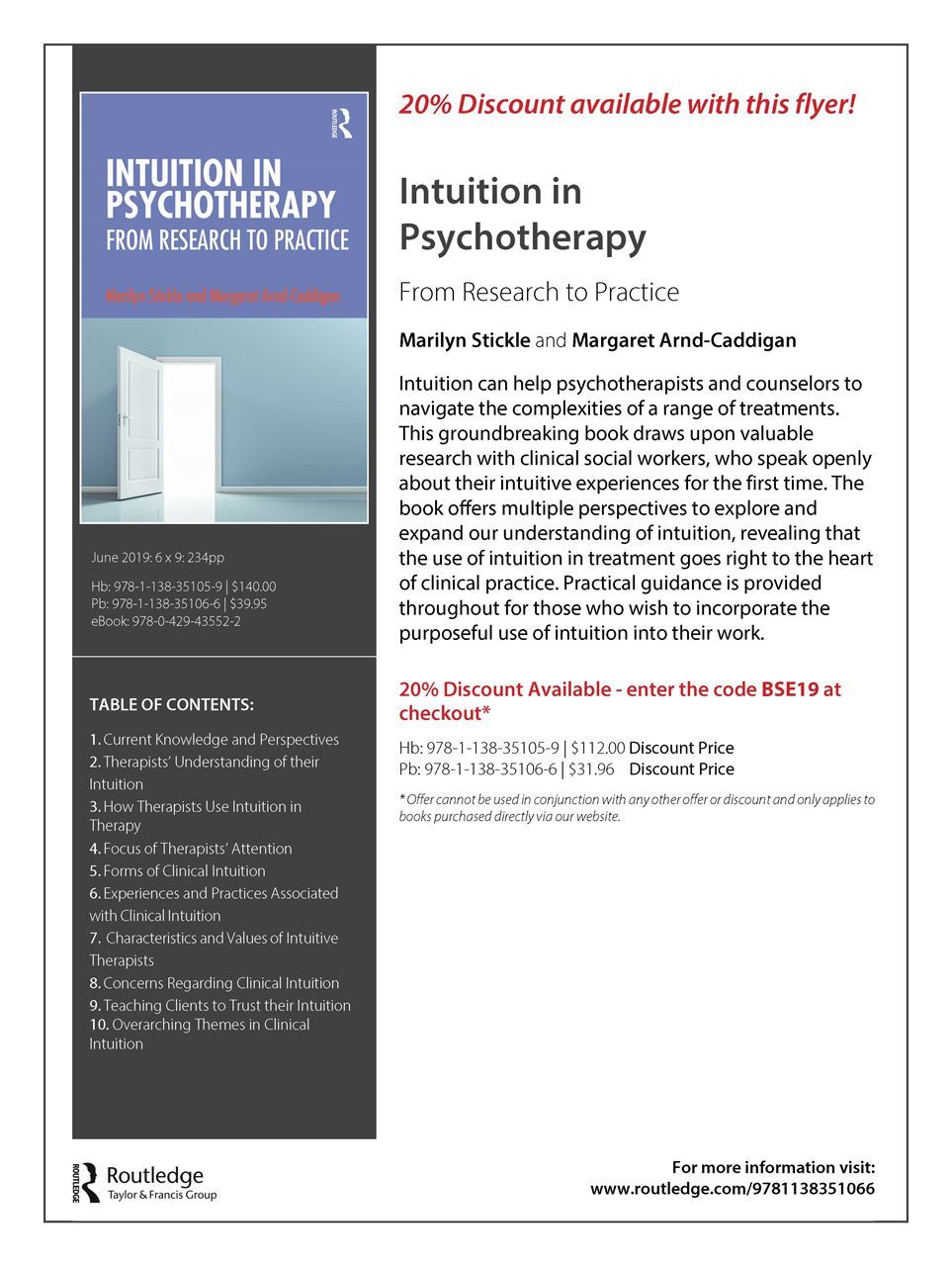
Consider advertising in the next issue of News & Views
Post ads for:
- continuing education training,
- office space, upcoming groups,
- job opportunities, specialized services, etc.
Please get in touch with Donna Dietz, GWSCSW Administrator (admin@gwscsw.org) to reserve your space for the next issue.
Don't forget -- we offer free design for your display ad!
senior seminar groups
Grace Lebow, Senior Seminar Chair
A survey was conducted for the benefit of our younger membership in order to help them to become more knowledgeable about the future and the no- no word, "retirement.“ Forty-eight members of the society participated in a survey of retiree experiences, those of people thinking ahead to retirement as well as those in the process and those who have recently retired. The results of the survey are printed in the December issue of News & Views.. Please encourage the younger career members to look this article up to get some long- range planning-ahead tips.
There are presently 5 Seminar Groups focusing on various phases of Retirement: those thinking way ahead, those entering the process of retirement, those at a later career stage who are not planning retirement but want to interact with similar others, and finally those who are retired and want colleageal exchanges with their peers in the retirement experience. I am sharing a report by one leader, Susan Miller, that will give you a sense of one such group.
We are completing our fourth year together. We’re a group of ten. We meet in each other’s homes once a month. Two members are retired. Several members are cutting back practices and moving towards retirement. Other members are going strong with no plans of retirement in the near future. The group provides a warm and safe place to share about ourselves, to give and get support, and to discuss the challenges, opportunities, discoveries and pleasures that come with this stage of life. The group has been a vehicle to deepen long-standing relationships and develop new friendships.
Thanks go to each of the five volunteer leaders and to their assistant leaders in the Senior Seminars meeting monthly:
Estelle Berley, whose Seminar has met since 2006, and to Estelle’s assistant, Carolyn DeVilbuss, who writes the superlative minutes; Marcie Solomon, whose Seminar has continued into its 2nd year; Sydney Frymire, who has led a Seminar in the Bethesda area since Sept. 2018; Rebecca Harrison, with a Seminar in McLean since 2017; and to Susan Miller, along with Karen Brandt, whose Seminar in NoVa began in 2015. See Susan Miller’s description of her group above.
Legislation & Advocacy | Federal
Laura Groshong, LICSW, Director, Policy and Practice
Implications of the UBH Decision for LCSWs
Much excitement has been generated in the mental health community since “the UBH decision” (that is, the decision in the US District Court in Northern California case of Wit et al versus United Behavioral Health, filed March 5, 2019) found UBH liable with respect to the denials of benefits claims. The clarity and detail of Chief Magistrate Judge Joseph Spero’s 106-page Findings of Fact and Conclusions has provided us with an extraordinary resource for moving forward.
At the same time, there are clear limits to this big win: this is not the end of insurance denials and parity violations. UBH will surely be appealing the judgment, and other judges may or may not uphold the present ruling. Further, the insurance arena is complex. Each state has its own insurance regulations, and each type of plan (ERISA, Medicare, Medicaid, Exchange Plans, or private) has a different source/s of oversight. (CSWA has posted information to clarify the differences in the Clinical Practices section of our website.)
How, then, can we use this decision effectively to affect access to mental health and substance use treatment? At the individual level, if your client is being denied care that you deem critical, the detailed court document provides a list of “generally accepted standards of care” that may prove very helpful in your discussion with the insurance representative.
Judge Spero spent considerable time during the hearing determining what is meant by "generally accepted standards of care." Many sources exist, and CSWA will post the judge’s summary of these on our website. The standards listed below were agreed upon by both plaintiffs and UBH. The wording is taken from the court document itself:
- effective treatment requires treatment of the individual’s underlying condition and is not limited to alleviation of the individual’s current symptoms
- effective treatment requires treatment of co-occurring behavioral health disorders and/or medical conditions in a coordinated manner that considers the interactions of the disorders and conditions and their implications for determining the appropriate level of care
- patients should receive treatment for mental health and substance use disorders at the least intensive and restrictive level of care that is safe and effective
- when there is ambiguity as to the appropriate level of care, the practitioner should err on the side of caution by placing the patient in a higher level of care
- effective treatment of mental health and substance use disorders includes services needed to maintain functioning or prevent deterioration
- appropriate duration of treatment for behavioral health disorders is based on the individual needs of the patient; there is no specific limit on the duration of such treatment
- unique needs of children and adolescents must be taken into account when making level of care decisions involving their treatment for mental health or substance use disorders
- determination of the appropriate level of care for patients with mental health and/or substance use disorders should be made on the basis of a multidimensional assessment that takes into account a wide variety of information about the patient.
The nine plaintiffs whose cases were reviewed during the ten-day bench trial included denials of residential treatment for substance use disorder, for rehab, for mental health treatment, and, in two cases, for teenagers with substance issues, as well as denials of outpatient mental health treatment two to three times per week, and Intensive Outpatient Treatment (IOP) for a minor with SUD. The Judge provided detail for each case considered, noting the discrepancy between the UBH-stated standard of care and the actual guidelines that the reviewers were expected to follow. His descriptive language throughout, when referring to the UBH testimony, tended toward generous use of the words “evasive,” “even deceptive,” and “not credible.”
Given the widespread interest in this case, LCSWs may want to be assertive in appealing denials of care, especially where there is any failure to meet the standards. As you present your argument, even if you are dealing with a different insurer and a different type of plan, a mention of the UBH case will likely have an effect on the discussion. (The CSWA website has an Appeals template in the Members-only section; the generally accepted standards of care list will also be there, as well as a description of the five types of insurance plans.)
Another important avenue for LCSWs may be their state insurance laws/regulations and then perhaps their legislators. The plaintiffs came from different states, and three of these states, Illinois, Connecticut and Rhode Island, have legislation mandating use of the American Society of Addiction Medicine (ASAM) Standards in their insurance laws/regulations; it was not difficult to demonstrate that the UBH denials violated the state laws/regulations. A fourth state, Texas, has Department of Insurance criteria for standards of care; this proved equally effective.
Summary
The UBH decision is a good step toward making mental health and substance use parity a reality but is far from the end of making this happen. For now, we can speak out strongly on standards of care, ensure that standards in the client’s policy are being respected in any review process, and feel comfortable noting the UBH loss in court, based on violation of these standards, as a basis for appealing a denial of care. As for the next steps, LCSWs should look to state laws/regulations governing insurance, including any standards of care or enforcement of parity. (Such information may be online at the website of the Office of the Insurance Commissioner.) Insurance is a state-based system and it may be possible to make a legislative proposal about mental health and substance use that would appeal to your state legislators. Watch for more information from CSWA on this topic soon.
Footnote: Case 3:14-cv-02346-JCS Document 18 (Findings of Fact and Conclusions of Law). Heard and ordered UBH liable 2/28. Filed 3/05/19. 106 pages. United States District Court, Northern District of California.
Legislation & Advocacy | District of Columbia
Margot Aronson
Following up on the good news announced in Judy Gallant’s article in the March newsletter, that Adele Natter, LICSW, has agreed to be co-chair of the GWSCSW’s DC Legislation and Advocacy Committee, a more formal introduction to the experience she brings to the position is in order.
Adele has been active with our committee for several years, with a special focus on DC Board of Social Work issues. In private practice since 1998, she is also a Clinical Instructor at the George Washington Medical School’s Psychiatry Residency Program, and supervises graduate social workers working toward advanced licensure. Her previous career has primarily been in mental health clinics and in trauma work.
In addition to her BA in Psychology from UCLA and her MSW from the University of Maryland, Baltimore, Adele holds certifications from the Washington School of Psychiatry in Child and Adolescent Psychotherapy and in Intensive Short-Term Dynamic Psychotherapy (ISTDP), and has had post-graduate training in psychodynamic psychotherapy, group psychotherapy, and Dialectical Behavior Therapy (DBT).
Here’s a hearty welcome to Adele, and a thank-you for stepping forward to take a leadership role.
And Good News at the April DC Board of Social Work meeting
At the Open Session of the meeting on April 22, Interim Executive Director Aisha Nixon announced that candidates for the long-vacant Board positions - LICSW and LSWA - are in the final process of being vetted, and hopefully will begin their tenures in time for the June meeting. Ms. Nixon also reported on our latest District of Columbia social work licensee numbers: 5,312 total, with 3,686 LICSWs, 56 LISWs, 1,492 LGSWs, and 78 LSWAs.
Board Chair Velva Spriggs, LISW, explained that discussion of the Board’s policy on LGSWs working in a private practice setting has been tabled temporarily, while the Board researches supervision issues. She and Board members Danielle Nelson, LGSW, and Selerya Moore spoke of their attendance at a recent meeting of ASWB (Association of Social Work Boards). They shared their enthusiasm about getting to know their counterparts from around the country and Canada, and spoke of the variety of issues faced in other jurisdictions. Happily, ASWB is establishing a Task Force to consider the numerous concerns about supervision; we expect this will be very helpful as our DC Board makes final policy decisions on LGSW private practice issues. ASWB will also be developing a curriculum guide to clarify regulations for college and graduate school social work educators.
Will the DC Board accept your CEUs?
Social Work licensees are responsible for making sure that their CEUs will be accepted by their jurisdiction’s Board. Unfortunately, it has become clear that many of our social workers, and a number of organizations, were unaware of the regulation change in 2017, whereby the Board no longer automatically will accept CEUs approved by the Maryland Social Work Board of Examiners. GWSCSW is an approved provider of DC CEUs, but various other organizations have relied on the Maryland approval.
Before the Open Session of the Board meeting ended, GWSCSW requested that the Board take a new look at the process and qualifications needed for CEU approval.
For more information about the regulations, the Board’s webpage has a link to the DC Municipal Regulations for Social Work, “Chapter 70 Social Work June 9-8-2017.” CEU information is in section 7009, with the relevant issue at 7009.6. In addition, the HORA – the Health Occupations Revision Act – outlines scope of practice and other social work law; this document is also linked on the DC Board website.
There was no Board meeting in May. The next meeting of the Board will be Monday, June 24; the Open Session will begin at 10 AM.
The 2019 License Renewal Process
The license renewal-on-line process began on May 1, with, as of course you know, a deadline of July 31, 2019. If you have not received an email from the Board explaining the steps of the on-line process, be sure to provide the Board with your updated email address.
Margot Aronson, LICSW, chairs the GWSCSW L&A committee for DC. A past GWSCSW president, she has also served as newsletter editor and director of Legislation & Advocacy. Margot currently advocates on mental health and LCSW practice issues for us all at the national level as the Clinical Social Work Association Deputy Director for Policy and Practice.
Legislation & Advocacy | Maryland
Judy Gallant
This report is based, in part, on the multi-page summary of this year’s legislative session from our lobbyist, Pam Metz Kasemeyer, JD.
The Maryland General Assembly adjourned its 439th Session on Monday, April 8th, ending a session that began with 60 new legislators. The Legislature debated major issues, including increasing the minimum wage, implementing the Kirwan Commission report recommendations having to do with school funding, addressing opioid use, and stabilizing the health insurance market.
School trauma, impact on minors and what we can do about it
In our last newsletter, I had written about the enlightened approach some legislators were proposing to create a pilot program to evaluate guidelines on a trauma-informed approach in schools. The pilot program, which we supported, was designed to assist schools in dealing with trauma experienced by both students and staff, with the hope of minimizing the impact of trauma on student learning, but the bill to create a pilot program in some schools failed in this year’s session.
In early in May, I attended a day-long conference looking at trauma and schools and heard one of the bill’s sponsors, Delegate Janelle Wilkins. She reassured conference goers that she will re-submit a bill to the MD General Assembly in 2020 for passage. Additionally, Peter Fonagy, PhD, Director of the Anna Freud Centre for Children and Families in London, spoke about the impact of trauma on children and society. He said that trauma is not an “event,” but rather an experience associated with the event. Adversity becomes traumatic for a child when the child experiences him- or herself as being alone. A world-renowned psychoanalyst, Dr. Fonagy presented a strong case for the community to create a sense of trust for children attending school, and that a whole-school response is needed to address the impact of trauma there. His presentation suggests to me that a community response should be supported by legislation such as Delegate Wilkins proposed. This is where GWSCSW clinicians can present the strongest case to support legislation to improve children’s mental health by discussing our clinical experience and knowledge with legislators.
Another law impacting minors that passed is the Child Advocacy Centers-Expansion. This bill alters and establishes numerous requirements for child advocacy centers in the State. The Governor’s Office of Crime Control and Prevention must ensure that every child in the State has access to a child advocacy center. The bill also requires the Governor to include at least $300,000 in the annual budget bill for child advocacy centers.
Criminal Law issues
This Session established two new laws that create misdemeanors for those who violate them, with implications for clinicians. See MARYLAND SOCIAL WORKERS: AVOID 3 YEARS IN PRISON!! for major news on the criminalization of failure to report child abuse and neglect by mandated reporters.
A law we supported that passed with hopefully a more positive impact was “Grace’s Law,” which deals with electronic harassment and bullying. The bill redefines “electronic communication” to mean the act of transmitting any information, data, writing, image, or communication by the use of a computer or any other electronic means, including a communication that involves the use of email, an instant messaging service, an Internet website, a social media application, a network call, a facsimile machine, or any other Internet-based communication tool. A person may not maliciously engage in electronic conduct if the conduct has the effect of intimidating, harassing, causing physical injury or serious emotional distress to a minor, or if the person intends to impact the minor in any of those ways. The most serious penalty of violating the statute is reserved for someone who intends to induce a minor to commit suicide through electronic means. In this case, the convicted person would be guilty of a misdemeanor and subject to imprisonment not exceeding 10 years or a fine not exceeding $10,000 or both.
Stay tuned for additional information about the 2019 Session in the September newsletter. As always, do not hesitate to contact Judy Gallant at judy.gallant@verizon.net with input on the laws discussed above, or other issues relating to Maryland mental health policy.
Judy Gallant, LCSW-C, is the director of the Society’s Legislation & Advocacy program, as well as chair of the Maryland Clinical Social Work Coalition, our GWSCSW legislative committee in Maryland. She maintains a private practice in Silver Spring.
Pamela Metz Kasemeyer, JD, and her firm of Schwartz, Metz & Wise, PA, represent us in Annapolis and guide our advocacy strategy. Ms. Kasemeyer is an acknowledged authority on Maryland’s health care and environmental laws and has represented a variety of interests before the Maryland General Assembly and regulatory agencies for more than 25 years.
Legislation & Advocacy | VIRGINIA
Judy Ratliff
The Virginia Board of Social Work (VBSW) started the "Fast Track" on 8/15/2018 for proposed regulations to implement the 2018 General Assembly law adding definitions of Bachelors Social Worker and Master's Social Worker. The regulations have advanced through all stages and are now on the Governor's desk, where they have been for over 130 days. Please note that there is no timeline for how long regulations can be at the governor's office stage.
Joe Lynch, legislative vice president for Virginia Society for Clinical Social Work (VSCSW) has written to Dr. David E. Brown, Director of the Virginia Department of Health Professions on behalf of both of our Societies. The letter requests that Dr. Brown consider "updating the language in Code Sections of Virginia law that contain the phrase"...the individual's treating physician or the individual's treating clinical psychologist..." to include other licensed mental health professionals, such as social workers and professional counselors.
Joe Lynch has submitted public comments reflecting concerns of both of our Societies on aspects of definitions and requirements for Qualified Mental Health Professionals (QMHPs) that affect social workers who are also QMHPs. More will be presented on this as these issues evolve.
Several Laws were passed this year that will help low-income and other Virginia residents:
- People can no longer have their licenses suspended if they owed court fines and fees.
- Laws that disproportionally favored landlords over tenants contributed to Virginia having one of the highest rates of rental evictions in the country. According to Delegate Ken Plum, "a series of revisions to create a better balance in the law and that provides more options for tenants should make the laws operate more fairly."
- Delegate Plum also noted that "Virginia has had a very bad record in its management of its foster care program. Major changes in the laws related to foster children should greatly improve the situation."
- On April 29, 2019, Governor Northam vetoed Senate Bill 1579, which falls short of establishing criteria in the Code of Virginia by which congressional and state legislative districts must be drawn.
- On 5/1/19, Governor Northam announced his commitment to oppose additional mandatory minimum sentences for the remainder serif his term. He wrote in a Washington Post editorial that "Mandatory minimums are focused on punishment, not rehabilitation...we need to focus on evidence-based approaches that ensure equitable treatment under the law." He stated further that: "My commitment today will not resolve all of the issues with our criminal justice system" but he views it as a step "to make our Commonwealth fairer and more equitable for communities of color."
- On 3/14/2019, the Governor and the Virginia Department of Behavioral Health and developmental Services (BHDS) announced that "all 40 Community Service Boards (CSBs) in the Commonwealth have Same Day Access available to Virginians seeking mental health services in their communities. A person in need of a mental health evaluation can now access walk in hours at any CSB in Virginia without an appointment, instead of waiting days, or even weeks, to receive an assessment."
- On February 28, 2019, the Governor signed a series of measures aimed at reducing eviction rates in the Commonwealth.
Judy Ratliff, LCSW, is chair of the Society’s Legislative Committee for Virginia. In addition to her years of GWSCSW service, Judy has served on the Fairfax County Long Term Care Coordinating Council and in Leadership Fairfax. She began her professional life as a medical social worker, has taught medical and social work students for the University of Maryland, and is currently in private practice in Fairfax.

The Mentor Program is always looking for new mentors to work with newer social workers who are looking for guidance and help as they start their careers. You determine how much time you want to give; this is worked out with the mentee. For questions please contact Nancy Harris, coordinator of the Mentor Program, at (301) 385-3375, or nlharris1214@gmail.com. Thank you for your support of this important benefit of GWSCSW membership! |
New Member Brunch was a big Success!
The bi-annual New Member Brunch was held on April 28, 2019 at the home of Cindy Crane. The sun was shining on Cindy’s backyard where we listened to the sound of her fountain bubbling into a pond and learned how GWSCSW benefits all of us and also how new members get involved. Over 25 new and old members attended. The new members heard from several “old” members who described all the things that GWSCSW offers to its members.
- Susan Post and Robin Seiler talked about the Continuing Education committee
- Beverly Magida described the upcoming Annual Dinner, to be held on June 2
- Nancy Harris talked about the Mentor Program gaining 3 new mentees
- Judy Gallant talked about the important work of the Legislative committees
- Kate Rossier presented an overview of GWSCSW, talked about its history and described the Communications committee
- Chrissy Wallace informed new members about the Early Career committee.
POETRY: FORECAST
Marilyn Austin
From clouds of anonymity
I warily take a step
Look this way - - - -
look that - - - -
Feeling tarnished and soiled,
Will I be able to once again
feel clean and polished?
Unafraid to face the world
of judgement and assumption?
I will not survive if
I solely blame the "Other"
The past is immutable,
frozen in time,
stone cold in memory
yet writhing in hidden clouds.
But I am resolute
My response is mine
to resolve and put away
In the dark cellars of the past.
I will not be defined as a Victim
afraid and cowering in silence
My cautious steps will persist
toward the possibilities ahead -
to make the present and the future
Of my own defining.
Communications Branch
Kate Rossier, Director of Communications | Email: kazrossier@hotmail.com
Accomplishments of the past couple of months include: completing the revisions of the Board Manual (with thanks to all Branch and Committee Chairs who helped finalize their position descriptions and calendars!); working with Donna to complete the new Member Directory (both print and online versions); and beginning the process of working to update our website to be ever-more user-friendly and contemporary in its look. Ongoing work in the branch includes the monitoring of the listserv (thank you, Joel Kanter!); updating the society's Facebook page and writing Tech Tips for the newsletter (thank you, Chana Lockerman!); and soliciting articles for and editing the quarterly newsletter (big thanks to Nancy Pines and Donna Dietz!). If you have any questions about any of the above or would like to get involved in any of these activities, we would totally welcome you! Just reach out to me, Kate Rossier, Director of the Communications Branch, at DirCommunication@gwscsw.org.
EDUCATION Branch
Susan Post, Acting Director of Education | susan.post@gmail.com
Creative, fun groups for CE credit!
As we segue into summer, the Continuing Education committees are planning for fall 2019 – spring 2020. Beyond attending workshops planned by others, there are several ways in which YOU can create your own curriculum for exploring particular interests and earn continuing education credits at the same time.
Study groups. Members can organize groups that meet monthly and focus on particular topics of interest of their own choosing. Traditionally, these have been formed by members in their local areas, meeting either in their homes or offices or even libraries. Participants create reading lists of books and/or articles and the group may be led by one member or not have a leader. Attendance records are required so that Category 2 credits can be awarded. Groups such as these have been very successful, stimulating and creative, and some have lasted a long time.
“Meet Ups.” These are one-time gatherings to discuss a particular book or movie. In the past, these have included “Between the World and Me,” and “Moonlight.” Meet ups are organized by a member who hosts and leads the discussion, and they, also are lively and probing ways to deepen our understanding of complex societal issues. Again, Category 2 credits are awarded.
So put your thinking caps on while you have some time over the next few months, talk with your social work colleagues, and see if there’s something you’d like to dig into in depth to further your understanding and competence. The groups operate under the aegis of the Education Branch, and you may contact me to explore options, format, and organizational issues. These modalities are a terrific way to plan your own continuing education!
Committee Reports
Continuing Education Committee
Patricia Demont | Leila Jelvani
cecommittee@gwscsw.org
The Continuing Education Committee is accepting proposals for Fall 2019 and Spring 2020. Do you have a topic that you know others are interested in learning about? Would you like to share your expertise? This is a great opportunity to highlight your experience while promoting your practice. For shorter presentations, consider offering a Brown Bag lunch topic, typically lasting 1 ½ hours.
Click here to submit a proposal. Once submitted, the proposal will be reviewed by the Education Chair and the Continuing Education Committee.
Diversity Committee
Steve Szopa
steveszopa@gmail.com
Diversity Committee meetings will be restarting soon. We will be assessing progress on the recommendations that the Committee made to the Board last year. Another project in the planning phase is creating and distributing a brief survey to assess how welcoming and inclusive we are and to learn how we could do better. To that end, I am asking you to reach out to me and let me know if you have suggestions about how our Society could be more aware and responsive to people from all walks of life. As Vice President for two years and President for another two, I experienced Society leaders as aware, caring and dedicated to welcoming and empowering the full diversity of members. However, we all have room to grow and learn more about the wide array of human identities. Please feel free to email Steve Szopa at: steveszopa@gmail.com
In the future, the Diversity Committee is planning a variety of different features in this column. These include reports on articles and books that address topics about the human experience; special meet-up events and ongoing requests for feedback from members like you. The Diversity Committee can help the Society best by soliciting observations and ideas that come from you, your observations and your frame of reference. The Committee and I look forward to hearing from you.
Legislation & Advocacy Committee
Judy Gallant
dirlegislation@gwscsw.org
See individual jurisdiction articles for the latest updates. Be sure to contact one of us with any questions or suggestions you might have, or to join one of the committees: in DC, Margot Aronson, malevin@erols.com; in Maryland, Judy Gallant, judy.gallant@verizon.net; and in Virginia, Judy Ratliff, jratliff48@hotmail.com. We look forward to hearing from you.
Membership Committee
Cindy Crane, Nancy Harris, Catherine Lowry
membership@gwscsw.org
See article on the New Member Brunch.
Mentoring Committee
Nancy Harris
mentoring@gwscsw.org
The Mentor Program is always looking for new mentors to guide the newer social workers who are looking for guidance and help as they start their careers. You determine how much time you want to give; this is worked out with the mentee. For questions please contact Nancy Harris, coordinator of the Mentor Program at (301) 385-3375, or nlharris1214@gmail.com. Thank you for your support of this important benefit of GWSCSW membership!
Newsletter Committee
Nancy Pines
newsletter@gwscsw.org
Your newsletter welcomes ideas and articles about clinical social work and practice. We are also very interested in hearing from members who have specialized knowledge or adjunct therapy practices they want to share.
Please consider your own life experiences and how they may have affected how you practice. One of the things I love about our profession is how we are always learning. Why not share your expertise and life lessons with fellow members? Send an email with your story/article ideas to newsletter@gwscsw.org. Thanks!
Social Media Committee
Chana Lockerman
socialmedia@gwscsw.org
The Committee is excited to continue the work of sharing exciting content related to social work and mental health. We are continuing to update the GWSCSW Facebook page with articles. Please visit the page, like or comment on the posts. Let us know if you have an idea about how to make the page more relevant to YOU. We are working on getting more traffic to the Facebook page. Please like the page if you haven’t already, and share the page with your fellow colleagues! Feel free to email us at socialmedia@gwscsw.org if there is something you would like us to post about on the listserv. We are also available to field any personal questions you may have about your own social media pages and accounts. Contact Chana Lockerman chana@rockcreekcounseling.com with any questions or suggestions for future Tech Tips columns.
Volunteer Committee
Beth Pascoe
volunteer@gwscsw.org
OUT & ABOUT
Gina Sangster had an article entitled “Little Strong Man,” published in the April issue of The Hill Rag. An article by Pattie Cinelli in the March issue of the Hill Rag profiled the group practice she is a member of, Capitol Hill Consortium for Counseling and Consultation. Gina l participated in the poetry reading at the Literary Hill Bookfest on May 5th.
On April 3rd, GWSCSW member, Martin Schnuit, LCSW-C set up a display table at the University of Maryland School of Social Work's job fair. Students from Washington, DC, Montgomery County, Baltimore County and Baltimore City stopped at the table and were especially interested in the free membership, mentoring, and continuing education opportunities. A special thank you to Associate Professor Dr. Debbie Gioia and Assistant Dean Dawn Shafer for inviting and hosting us at the school! Any GWSCSW members/University of MD alumni who would like to assist at future job fairs, please contact Marty at mschnuitlcswc@aol.com or 410-919-9397.
GWSCSW Job Board
GWSCSW is proud to feature a job resource to connect career opportunities with our members.
Visit the GWSCSW job board to look for jobs or to post a job today.
Manage Your Career:
- Search and apply to positions that value your credentials!
- Upload your anonymous resume so employers can contact you, but you maintain control of your information and choose to whom you release your information.
- Receive an alert every time a job becomes available that matches your personal profile, skills, interests, and preferred location(s).
- Access career resources and job searching tips and tools.
Recruit for Open Positions:
- Post your jobs, or your institution's jobs, where the most qualified professionals will find and apply to them.
- Email your jobs directly to job seekers via the exclusive Job Flash email.
- Search the resume database and contact qualified candidates proactively.
See some featured jobs below.
classified advertising
Advertisements, accompanied by full payment, must be received by the GWSCSW by the first of the month preceding publication. Material should be sent to admin@gwscsw.org. For questions about advertising, call 202-537-0007.
Adolescent/Young Adult Therapy: CBT, DBT, Medical Illness Counseling, Unified Protocol, Group Therapy. Powerful interventions for depression, anxiety, anger, perfectionism, fear, shame, rumination, social anxiety, ASD and more. Rathbone & Associates. Rely on Experts. 301-229-9490 www.rathbone.info. Professional CEUs: See our current schedule at www.rathbone.info, click on “Professional Trainings”. Current topics, quality speakers, practical skills. Office space for rent: Lovely office with lots of light available part time. GW area. Contact Stefan Lund, PhD | 703-732-1527 or Vera Sky, LICSW | 202-577-5226. | 3-office suite in a Pre-War building in Tenleytown, NW at the corner of Wisconsin and Van Ness, with hardwood floors, view of trees, and an art collection on the walls. Two offices available, one furnished, one empty (could be furnished if requested). Either is available to rent June 1st, Full Time, by the day or by the hour. There is a spacious waiting room, in-suite bathroom, and admin office with WIFI, printer/fax, microwave and small fridge. Building has accessible entrance in rear and is a 5 min walk to Tenleytown Metro on the Red Line. Easy street parking for clients. Photos available upon request. Feel free to email at skarliner@comcast.net or call at 240-678-0662. |
Classified Ads: 75¢ per word | Minimum price $15 (20 words)
Display Ads: Full page 7 x 9¼ $325 | Half page $250| Quarter page $125 | Eighth page $75
Electronic submission (JPG) preferred. Publication does not in any way constitute endorsement or approval by GWSCSW, which reserves the right to reject advertisements for any reason at any time.
About News & Views
Do you have thoughts or feedback about something you read in our latest issue? Perhaps something struck a chord?
We want to hear from you! Your opinions about clinical and legislative articles, practice-building tips and regular columns are most welcome. Send your feedback to: newsletter@gwscsw.org
Questions? Contact Nancy - npines12@aol.com
News & Views Committee
Nancy Pines, Editor
Newsletter Editorial Board: Sara Feldman, Adele Natter, Shoba Nayar
Advertising: admin@gwscsw.org
News & Views is published four times a year: March, June, September and December.
Articles expressing the personal views of members on issues affecting the social work profession are welcome and will be published at the discretion of the editorial board. Signed articles reflect the views of the authors; Society endorsement is not intended. Articles are subject to editing for space and clarity.
News & Views Submission Guidelines
Articles – Focus on your area of expertise and practice, ethical dilemmas, responses to events in the media or other topics relevant to clinical social work. Articles should be 500–700 words.
Out & About – Share news about you: an article you’ve written, if you’ve been in the news, taught a class, earned a new certification or are a singer, artist or writer. Submissions should be 50 words or less. Send all submissions to npines12@aol.com
Submissions will be reviewed and are subject to editing for space and clarity.
Next submission deadline: July 31, 2019
Need to reach a Board member? Click here for the listing of the GWSCSW Board of Directors


